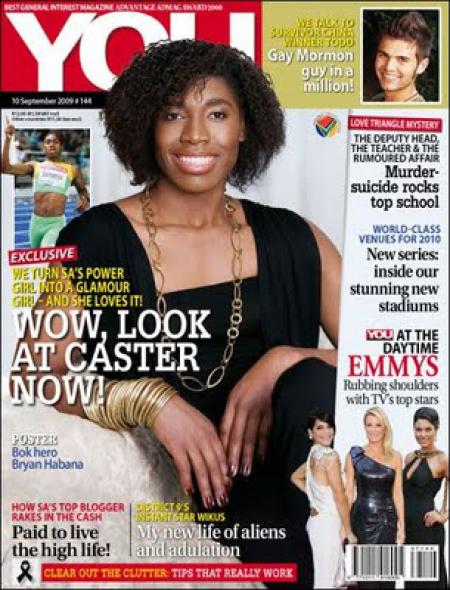Serendip is an independent site partnering with faculty at multiple colleges and universities around the world. Happy exploring!
Female Athletes and Gender Testing
I've been thinking about female athletes and gender this week after reading a part in My Gender Workbook that described female athletes as being able to "transcend gender" in the act of participating in sports, and trying to figure out how gender plays into athletics in general. For so long, women really weren't seen as athletes. They couldn't play anywhere near the variety of sports that men could, and couldn't compete in the few sports they were allowed at a high level. The advent of Title IX helped to dramatically change that. However, something that I found incredibly troubling is the presence of gender testing of athletes.
In 2009 Caster Semenya, an 18 year old South African, was subjected to a variety of tests designed to ascertain her "true gender" after she won the gold medal in the 800 meters at the World Championships in Berlin. She'd lived her whole life as a woman but authorities called her gender into question because of her strength and appearance. After an extended period of time, Semenya was allowed to return to competition as a woman, but she participated in a make-over for the South African magazine "You" that made her appear more feminine.
In 2006, a similar situation occurred where Santhi Soundarajan actually lost her silver medal for the 800m in the Asian Games because tests proved her ineligible to compete as a woman, even though she'd been previously tested and they deemed her eligible. I find it incredibly offensive and humiliating that these people can say that someone is "too strong" or "too fast" to be a woman. The variety of tests that have to be conducted--physical examinations, blood tests, psychological testing--prove that gender is not black and white. What does this mean that your gender can be "disproved"?




Comments
pejordan, I think beside the
pejordan, I think beside the issue of gender testing you raised above, many other traditional gender roles often seem at odds with women in athletics. Are they an athlete or a female? Can they be both? Can they be mothers and wives and take care of families while finding the hours in the day to train, travel, and compete (in any sport) at the highest level? There is often an overlapping image stereotype surrounding women athletes and their supermodel counterparts. Female athletes are constantly encouraged to be sexy and thin but possessing enough strength to participate in their respective sport effectively.
Also, the media constantly reinforces this stereotype that there should be a certain level of sex appeal among women athletes. In order to be considered an athlete and be placed on the cover of a sports magazine, one must be sexy and thin. During the 1999 Women’s World Cup title game against China, Brandi Chastain struck a penalty kick into the back of the net and spontaneously ripped off her top in celebration, exposing a sports bra. This situation wreaked havoc in media outlets across America, as writers focused more on what they considered a striptease rather than her efforts to lead the women to their second World Cup victory. It is possible that this situation further made evident the heterosexual view that women shouldn’t play sports unless their bodies are perfect, sexy and “right” according to traditional femininity standards.